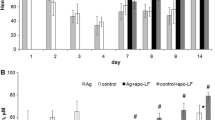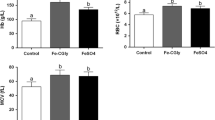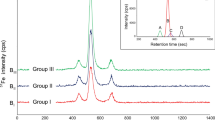Summary
(1) Attempts to determine the redox-state of the absorbed iron, which appeared in the portal blood when the free iron-binding capacity was previously saturated, indicate that about 30–90% of this iron was in the ferrous state. This effect was particularly prominent after luminal administration of ferrous iron, but was also seen when iron was given in the ferric state. (2) Total iron absorption is significantly higher in ceruloplasmin-substituted copper-deficient animals as compared to copper-deficient controls. (3) The appearance rate of absorbed iron in the portal blood of copper-deficient animals increased several times immediately after the intravenous infusion of ceruloplasmin. (5) The distribution of absorbed iron was changed due to the ceruloplasmin substitution: it was increased in the reticulocytes (+66%), plasma (+400%) and the body (+ 112%), whereas in the liver it was decreased by about 78%. (5) In iron-deficient rats intravenously injected ceruloplasmin did not increase iron absorption. (6) The conclusion was drawn that, as for the entrance into the mucosa from the luminal side, also for the release at the contraluminal side into the portal blood, the ferrous state of iron is favoured and that ceruloplasmin accelerates the release into the portal blood by catalyzing the oxidation of ferrous iron due to its high Fe(II):oxygen oxidoreductase (EC 1.16.3.1) activity.
Similar content being viewed by others
References
Brittin GM, Chee QT (1969) Relation of ferroxidase (ceruloplasmin) to iron absorption. J Lab Clin Med 74:53–58
Chase MS, Gubler CJ, Cartwright GE, Wintrobe MM (1952) Studies on copper metabolism IV. The influence of copper on the absorption of iron. J Biol Chem 199:757–763
Coppen DE, Davies NT (1988) Studies on the roles of apotransferrin and caeruloplasmin (EC 1.16.3.1) on iron absorption in copper-deficient rats using an isolated vascularly and luminally perfused intestinal preparation. Br J Nutr 60:361–373
Eastham EJ, Bell JI, Douglas AP (1977) Iron-transport characteristics of vesicles of brush-border and basolateral plasma membrane from the rat enterocyte. Biochem J 164:289–294
El-Shobaki F, Rummel W (1985) Mucosal iron binding proteins and the inhibition of iron absorption by endotoxin. Blut 50:95–101
Forth W, Rummel W (1973) Iron absorption. Physiol Rev 53:724–792
Frieden E (1980) Caeruloplasmin: a multi-functional metalloprotein of vertebrate plasma. Ciba Found Symp 79:93–124
Gubler CJ, Lahey ME, Chase MS, Cartwright GE, Wintrobe MM (1952) Studies on copper metabolism 111. The metabolism of iron in copper deficient swine. Blood 7:1075–1092
Hopfer U (1986) Membrane transport mechanisms for hexoses and amino acids in the small intestine. In: Johnson LR, Christensen J, Jackson MJ, Jacobson ED, Walsh JH (eds) Physiology of the gastrointestinal tract, 2nd edn, vol 2. Raven Press, New York, pp 1499–1526
Huebers H, Rummel W (1984) Protein-mediated epithelial iron transfer. In: Czaky TZ (ed) Handbook of experimental pharmacology 70/I. Springer, Berlin Heidelberg New York, pp 513–541
Huebers H, Huebers E, Forth W, Rummel W (1971) Binding of iron to a non-ferritin protein in the mucosal cells of normal and iron-deficient rats during absorption. Life Sci 10:1141–1148
Huebers HA, Csiba E, Rummel W, Finch CA (1983) The significance of transferrin for intestinal iron absorption. Blood 61:283–290
Lee GR, Nacht S, Lukens JN, Cartwright GE (1968) Iron metabolism in copper-deficient swine. J Clin Invest 47:2058–2069
Lintzel W (1933) Zum Nachweis der Resorption des Nahrungseisens als Ferroion. Biochem Z 263:173–186
Lovstadt RA (1979) Activating effect of copper ions on the interaction of ceruloplasmin with catecholamines. Gen Pharmacol 10:147–151
Manis J, Schachter D (1964) Active transport of iron by intestine: mucosal iron pools. Am J Physiol 207:893–900
Marx JJM, Aisen P (1981) Iron uptake by rabbit intestinal mucosal membrane vesicles. Biochim Biophys Acta 649:297–304
McDermott JA, Huber CT, Osaki S, Frieden E (1968) Role of iron in the oxidase activity of ceruloplasmin. Biochim Biophys Acta 151:541–557
Moore CV, Arrowsmith WMR, Welch J, Minnich V (1939) Studies in iron transportation and metabolism. IV. Observations on the absorption of iron from the gastrointestinal tract. J Clin Invest 18:553–580
Morgan EH (1980) The role of plasma transferrin in iron absorption in the rat. Q J Exp Physiol 65:239–252
Morley CGD, Solberg L, Bezkorovainy A (1985) The removal of iron from transferrin by isolated plasma membranes of rat hepatocytes. In: Spik G, Montreuil J, Crichton RR, Mazurier J (eds) Proteins of iron storage and transport. Elsevier, Amsterdam New York Oxford, pp 175–178
Muir WA, Hopfer U, King M (1984) Iron transport across brushborder membranes from normal and iron deficient mice. Am J Physiol 248:G376-G379
Ochsenfarth H, Winne D (1969) Der Einfluß der Durchblutung auf die Resorption von Arzneimitteln aus dem Jejunum der Ratte. Naunyn-Schmiedeberg's Arch Pharmacol 264:55–75
Osaki S, Johnson DA (1969) Mobilization of liver iron by ferroxidase (ceruloplasmin). J Biol Chem 244:5757–5765
Osaki S, Johnson DA, Frieden E (1966) The possible significance of the ferrous oxidase activity of ceruloplasmin in normal human serum. J Biol Chem 241:2746–2751
Osaki S, Johnson DA, Frieden E (1971) The mobilization of iron from the perfused mammalian liver by a serum copper enzyme, ferroxidase I. J Biol Chem 246:3018–3023
Osterloh KRS, Simpson RJ, Snape S, Peters TJ (1987) Intestinal iron absorption and mucosal transferrin in rats subjected to hypoxia. Blut 55:421–431
Schosinsky KH, Lehmann HP, Beeler MF (1974) Measurement of ceruloplasmin from its oxidase activity in serum by use of odianisidine hydrochloride. Clin Chem 20:1556–1563
Shiman R, Neilands JB (1965) Isolation, characterization, and synthesis of pyrimine, an iron(II)-binding agent fromPseudomonas GH. Biochemistry 4:2233–2236
Sobala GM, Schorah CJ, Sanderson M, Dixon MF, Tompkins DS, Godwin P, Axon ATR (1989) Ascorbic acid in the human stomach. Gastroenterology 97:357–363
Stremmel W, Lotz G, Niederau C, Teschke R, Strohmeyer G (1987) Iron uptake by rat duodenal microvillous membrane vesicles: evidences for a carrier mediated transport system. Eur J Clin Invest 17:136–145
Thorstensen K, Romslo I (1984) Uptake of iron from transferrin by isolated hepatocytes. Biochim Biophys Acta 804:200–208
Winne D, Remischofsky G (1971) Der Einfluß der Durchblutung auf die Resorption von Harnstoff, Methanol und Äthanol aus dem Jejunum der Ratte. Naunyn-Schmiedebergs Arch Pharmacol 268:392–416
Wollenberg P, Rummel W (1987) Dependence of intestinal iron absorption on the valency state of iron. Naunyn-Schmiedeberg's Arch Pharmacol 336:578–582
Wollenberg P, Ullrich V, Rummel W (1983) Conjugation of Inaphthol and transport of 1-naphtholconjugates in the vascularly perfused small intestine of the mouse. Biochem Pharmacol 32:2103–2107
Author information
Authors and Affiliations
Rights and permissions
About this article
Cite this article
Wollenberg, P., Mahlberg, R. & Rummel, W. The valency state of absorbed iron appearing in the portal blood and ceruloplasmin substitution. Biol Metals 3, 1–7 (1990). https://doi.org/10.1007/BF01141169
Received:
Issue Date:
DOI: https://doi.org/10.1007/BF01141169




